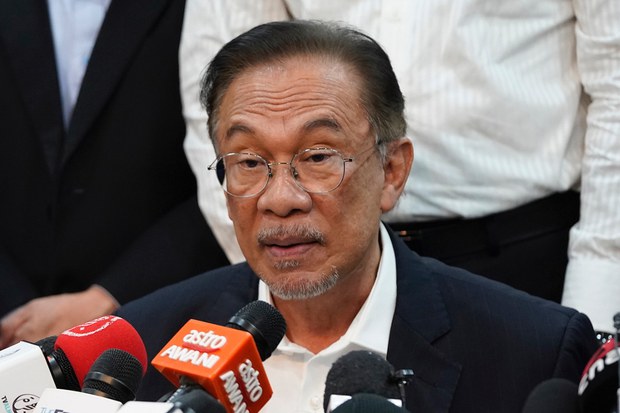Malaysia: Muhyiddin, Anwar Meet to Discuss COVID-19 Efforts
2020.04.14
Kuala Lumpur
De facto opposition leader Anwar Ibrahim called for an emergency parliamentary session on the coronavirus outbreak, after he met with Prime Minister Muhyiddin Yassin on Tuesday for the first time since the government changed in Malaysia.
Anwar said he met for 45 minutes in person with Muhyiddin to discuss the new government’s efforts to combat the COVID-19 pandemic. Muhyiddin was sworn in as PM early last month after the Alliance of Hope (Pakatan Harapan) government of Prime Minister Mahathir Mohamad collapsed in late February.
In a statement posted on Facebook, Anwar also said that he and Muhyiddin discussed his proposal for a special meeting of parliament, possibly on May 18, to discuss issues related to the pandemic.
Before the viral outbreak hit the Southeast Asian country, May 18 was announced as the date for parliament’s first meeting since Muhyiddin took over as prime minister, the post that Mahathir had been expected to relinquish to Anwar.
“I also raised concerns about the need for transparency in the delivery of information and enhanced testing capabilities,” Anwar said about the meeting. “The recently announced stimulus package is also welcomed, but the effectiveness of the package has to be ensured so it will not be politicized at the grassroots level.”
Muhyiddin’s office did not issue a statement about the meeting with Anwar.
To take over as prime minister on March 1, Muhyiddin broke from the Pakatan bloc led by Mahathir and Anwar to lead a new alliance dominated by parties representing the multi-ethnic country’s Muslim majority.
Muhyiddin’s ruling bloc includes the United Malays National Organization (UMNO) party of corruption-tainted ex-premier Najib Razak, as well as the faith-based and religiously conservative PAS party, which has been campaigning for stricter Islamic laws in the country.
Mahathir and other opposition politicians and activists had called for an urgent session of parliament to settle the matter through a no-confidence vote, although that meeting never occurred.
Responding to a question posted on his Facebook page, Anwar said he had assured Muhyiddin that there would be no call for a “no confidence” vote during the meeting on COVID-19. But he did not say if such a vote would occur at a different time.
“The government should not use COVID-19 to say they [officials] will be secure forever,” he said.
Economic concerns
Before meeting with Muhyiddin, Anwar’s office released a statement that he read in a Facebook post. It pointed out that economic analysts had projected that the Malaysian economy could shrink by as much as 4.6 percent this year.
He said the downturn necessitated two steps: “an honest characterization of the problem by the government,” and “dramatic and unprecedented measures to support the local economy, particularly the vast majority of Malaysians citizens and small business owners who do not have the savings to survive this downturn.”
“The recent optimism expressed by the finance minister over some projections that Malaysia can recover up to 5.8 percent growth in 2021 is troubling, unrealistic and misleading in light of the fact that we still do not know the full extent of the Covid-19 crisis impact, when it will end and how it will impact all of the economies which are linked to ours,” he said.
Anwar also said he was concerned that the nation’s stimulus package did “not adequately meet the gap in earnings to protect the most affected population from food insecurity and starvation, especially the children.”
“When I look at the sum total of data about Malaysia’s exposure to COVID-19 crisis, in particular our exposure to falling oil and other commodity prices, the ongoing impact of COVID-19 to our most important trading partners including China, the United States as well as our friends in ASEAN, and the global impact of COVID-19 on tourism and trade, I urge our leaders to be more realistic in their pronouncements,” he said in the statement.
On March 27, Muhyiddin’s government announced a stimulus package that allocated U.S. $29.6 billion for public welfare, $23.1 billion to support businesses and $460 million to bolster the economy, under what it dubbed as “The People-Centric Economic Stimulus Package.” Since then, it has allocated another $2.3 billion to help small businesses.








